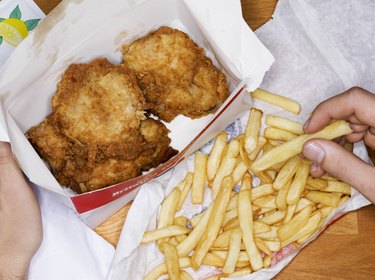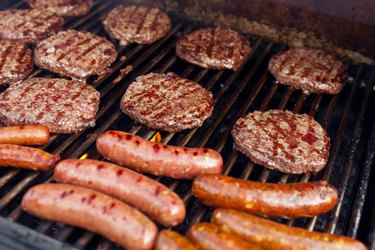
Many of us feel bombarded with the ever-changing and confusing nutrition advice out there. If that well-intended guidance leaves your head spinning, rest assured that recommendations for a heart-healthy diet have stayed pretty consistent over the years.
A good rule of thumb for eating with your heart is mind is to fill your plate with nutrient-dense foods, such as fruits, vegetables, whole grains, lean meats and low-fat dairy products.
Video of the Day
Video of the Day
But there are also a few foods you'll want to watch out for, as eating them too often may put you at a higher risk for heart disease and other heart-related health conditions.
Keep scrolling for the foods MDs and RDs say you should limit if you want to keep your heart healthy for years to come.
1. Foods High in Sodium
As much as 33 percent of people in the United States have high blood pressure (aka hypertension), according to the Centers for Disease Control and Prevention (CDC).
That means that their blood pressure is above 140/90, which is way higher than the recommendation to keep it under 120/80. All of that excess pressure on the heart puts you at risk for a heart attack, stroke, kidney failure and loss of vision, according to the American Heart Association (AHA).
Too much sodium in the diet is one of the main contributors to high blood pressure. And one of the reasons why taking in too much salt is harmful to the heart is because it ups the amount of water you retain, according to a September 2019 study in Nutrients.
All of that extra fluid is hard on the heart and limiting foods high in sodium can help you cut back on salt and help lower your blood pressure.
"Sodium has many adverse effects on the blood vessels (both large and small) because it causes higher blood volume levels," says Dr. Adedapo Adeyinka Iluyomade, a preventive cardiologist at Baptist Health Miami Cardiac and Vascular Institute.
"We now know that certain populations are more sensitive to salt than others, leading to more heart complications from salt-rich diets in these people," he adds.
Salty Foods to Limit
- Cured and processed meats (such as deli meats, jerky and canned meat)
- Salty snacks (such as pretzels, chips and crackers)
- Frozen dinners
- Fast food
- Processed cheese
How Much Is Too Much Sodium?
To keep your heart disease risk low, the AHA recommends limiting sodium to no more than 1,500 milligrams per day.
2. Foods High in Added Sugar
You know that foods high in added sugar are not good for your health, but they may be especially harmful to your heart.
People who took in 17 to 21 percent of their daily calories from added sugar had a 38 percent higher risk of dying from heart disease than those who only took in 8 percent of their calories from added sugar, an April 2014 study in the Journal of the American Medical Association found.
Researchers aren't sure exactly why this is the case, but they have some theories to help explain it: Too many added sugars in the diet may lead to weight gain and high blood pressure, and added sugars have been tied to higher inflammation in the body — both of which are risk factors for heart disease.
Dr. Iluyomade says it may also be related to diabetes. "Added sugars place people at higher risk of diabetes mellitus and abnormal cholesterol levels – mainly triglycerides," he says. "And it is well known that diabetes puts people at a significantly higher risk of heart attack, stroke, heart failure and heart-related death."
The AHA recommends keeping added sugar in your diet between 100 calories (about 6 teaspoons) and no more than 150 calories (9 teaspoons) per day. That comes out to around 5 to 7 percent of your daily calories if you eat a 2,000-calorie diet.
Sugary Foods to Limit
- Breakfast pastries and cereals
- Candy
- Desserts
- Condiments (such as ketchup and BBQ sauce)
- Processed foods (such as soups, cereals, granola bars and frozen meals)
3. Fried and Fast Food

It's no secret that fried foods and fast food aren't doing your heart any favors. In fact, fried foods — more specifically, fried chicken and fried fish — are associated with a higher risk of death from heart disease, according to a January 2019 study published in The BMJ.
There are several reasons why this might be the case. First, people often indulge in fried foods when they dine out and many of us don't know what type of oil our food is fried in.
"Fried foods are often rich in saturated fat, carbohydrates and sodium," Dr. Iluyomade points out. "The combination of these factors is known to accelerate atherosclerosis (the process by which plaque builds in the walls of arteries)."
He says this can raise the risk of both heart attack and stroke.
Another one of the negative effects of fast food is that it crowds out room for more nutritious foods that are good for your heart, such as vegetables and whole grains.
Fried Foods to Limit
- Deep-fried meats (such as chicken nuggets and fish and chips)
- Deep-fried finger foods (such as french fries, onion rings and mozzarella sticks)
- Fried snacks (such as potato chips and tortilla chips)
- Fried desserts (such as doughnuts and fried Oreos)
4. Foods High in Saturated Fat
You may have heard recent research doesn't necessarily conclude that saturated fats raise your risk of heart disease, but there are still good reasons to limit how much saturated fat you take in.
"These fats lead to higher blood cholesterol levels, especially low-density lipoprotein (LDL)," says Dr. Iluyomade. In turn, high LDL (bad) cholesterol raises the risk of blocked arteries, per Harvard Health Publishing.
Even further, replacing some of those saturated fats with healthier, polyunsaturated fats, such as those from avocado, flaxseeds and fish might help lower your risk of heart disease, according to Harvard Health Publishing.
This doesn't mean you have to cut the fat from your diet — just keep your saturated fat below 10 percent of your total calories for the day.
Foods High in Saturated Fat to Limit
- Butter
- Cheese
- Palm oil and coconut oil
- Fried foods or processed and shelf-stable foods
- Animal fat (such as beef fat, chicken skin and lard)
5. Highly Processed or Refined Grains

Refined grains have been shown to raise your risk for heart disease, according to a September 2019 report in Mayo Clinic Proceedings: Innovations, Quality, and Outcomes.
"Highly processed or refined grains adversely affect heart health because they're high in carbs and added sugar while also being low in fiber," Dr. Iluyomade says.
"This combination of factors is known to lead to the development of diabetes, obesity and abnormal cholesterol — and obesity is arguably the biggest threat to the heart health of populations in the developed world."
Fiber, which is abundant in whole grains, has been linked to better blood sugar control and lower cholesterol, and eating enough of it may lower your risk of conditions like heart disease, type 2 diabetes and obesity, according to the Mayo Clinic.
Fiber slows down digestion, so when the fiber is removed from the grain, the carbohydrates in them are digested faster, which can cause your blood sugar to spike, according to the Harvard T.H. Chan School of Public Health. Over time, this can lead to insulin resistance, which is a major factor in metabolic disease.
This doesn't mean you have to cut white rice and pasta completely. To get fiber and gain all the heart-healthy benefits, simply make sure half of the grains you eat every day come from sources of whole grains.
"While I still love white rice and yellow rice, I do limit how often I enjoy them," says KeyVion Miller, RDN of KeyVion Miller Nutrition. "Instead, I choose brown rice and quinoa because I want all the whole grain benefits."
Processed or Refined Grains to Limit
- White bread
- White rice
- Crackers
- Desserts and pastries made with refined flour
Related Reading
6. Sugary Drinks and Soda

Just like foods with added sugars, the sugar in what you're sipping can be harmful to your heart, too. And many so-called "healthy" drinks such as fruit juices, smoothies and restaurant coffee and tea drinks are high in added sugar.
In fact, sugar-sweetened beverages are the biggest source of sugar in the American diet, according to the Harvard T.H. Chan School of Public Health.
"Sugary drinks and sodas can be extremely detrimental to heart health in that they are high in calories without offering satiety, which raises your risk of having obesity," says Dr. Iluyomade.
Elizabeth Ward, RDN of Better is the New Perfect, thinks of it this way: "I don't drink sugary beverages mainly because I don't want to spend calories on drinks that have nothing to offer but added sugar."
Drinking soda has been directly linked to a higher likelihood of having a heart attack or stroke, or of dying from vascular disease, according to Harvard Health Publishing. Interestingly, heart disease risk factors were higher for people who drank any type of soda, whether regular or diet soda.
Sugary Drinks to Limit
- Fruit juices
- Sports drinks
- Smoothies made with fruit juices or sweetened milk alternatives
- Soda
- Diet soda, and artificially sweetened beverages
- Some restaurant coffee and tea beverages
What About Diet Soda?
A growing body of research shows a link between drinking diet soda every day and heart disease risk factors, according to Harvard Health Publishing.
Experts say this could be because artificially sweetened beverages confuse the brain and signal metabolic processes that lead to the storage of body fat, according to the Endocrine Society.
7. Red Meat

Burgers and hot dogs may be synonymous with American culture, but eating them often may put your heart health at risk.
"Red meats are not only high in saturated fat, but when they're digested, components of red meat lead to the production of Trimethylamine N-oxide (TMAO), which has been shown in multiple studies to raise inflammation, high blood pressure and atherosclerosis," he says.
People with higher levels of TMAO in their blood may have more than double the risk of heart attack, stroke or other serious heart problems, according to Harvard Health Publishing.
If you enjoy eating red meat, you don't have to cut it out of your diet completely. Instead, opt for lean cuts and avoid processed forms, such as burgers, hot dogs and breakfast meats, as best you can, per the AHA.
Substituting one serving of red meat per day for other foods, such as whole grains, fish, low-fat dairy or legumes, could even lower your risk of dying by 7 percent, according to the Harvard T.H. Chan School of Public Health.
Red Meats to Limit
- Beef (including steaks and burgers)
- Pork (including bacon and sausages)
- Lamb
- Venison
- Veal
- Goat
- American Heart Association: "Health Threats from High Blood Pressure"
- Nutrients: "Sodium Intake and Hypertension"
- JAMA: "Added Sugar Intake and Cardiovascular Diseases Mortality Among US Adults"
- The BMJ: "Association of Fried Food Consumption with All Cause, Cardiovascular, and Cancer Mortality: Prospective Cohort Study"
- Toxicology Reports: Evaluation of the Deleterious Health Effects of Consumption of Repeatedly Heated Vegetable Oil"
- Harvard Medical School: "The Truth About Fats: The Good, The Bad, and The In-Between"
- Mayo Clinic Proceedings: Innovations, Quality & Outcomes: "A Clinician's Guide to Healthy Eating for Cardiovascular Disease Prevention"
- The New England Journal of Medicine: "Glycemic Index, Glycemic Load, and Cardiovascular Disease and Mortality"
- Harvard Health Publishing: Is there a link between diet soda and heart disease?
- Harvard Health Publishing: Red meat, TMAO, and your heart
- National Institutes Of Health. Risk in red meat?
- Salt sensitivity. Definition, conception, methodology, and long-term issues
- Cleveland Clinic: Is Red Meat Bad for You?
- Harvard T.H. Chan School of Public Health: Added Sugar
- Harvard T.H. Chan School of Public Health: Whole Grains
- Mayo Clinic: Dietary Fiber: Essential to a Healthy Diet
Was this article helpful?
150 Characters Max
0/150
Thank you for sharing!
Thank you for your feedback!